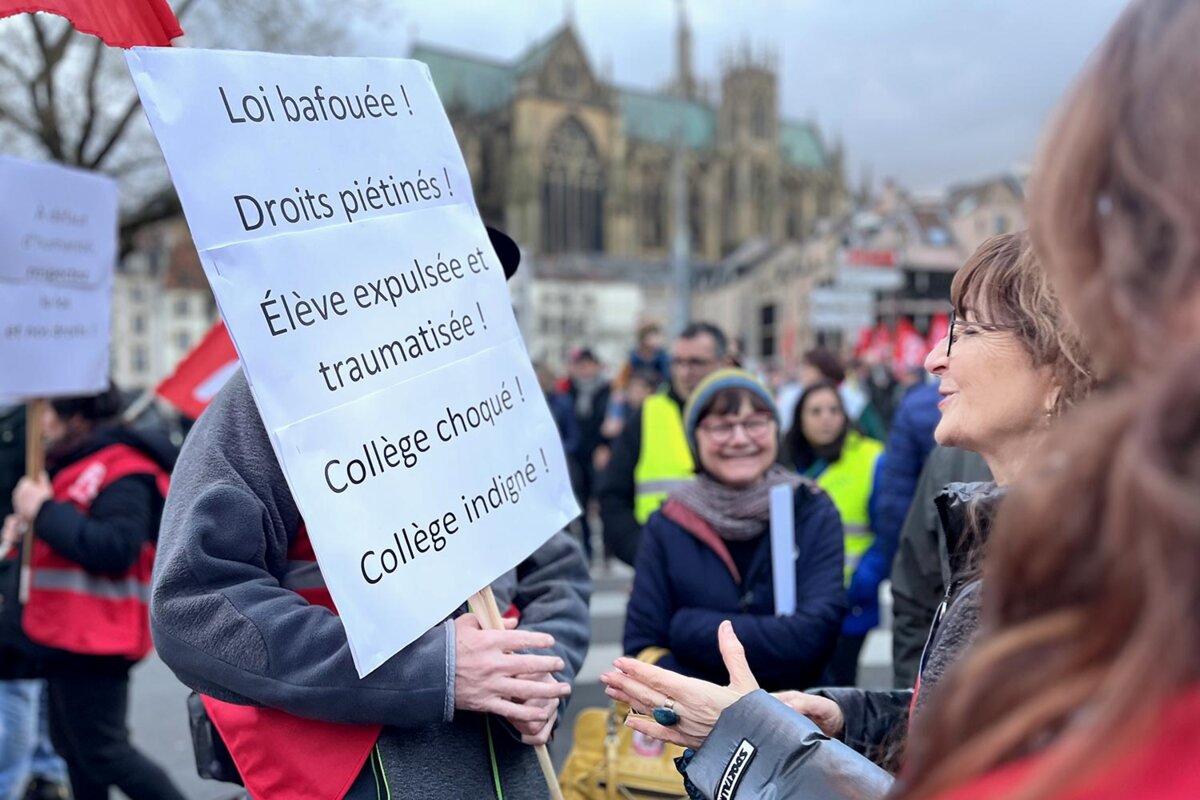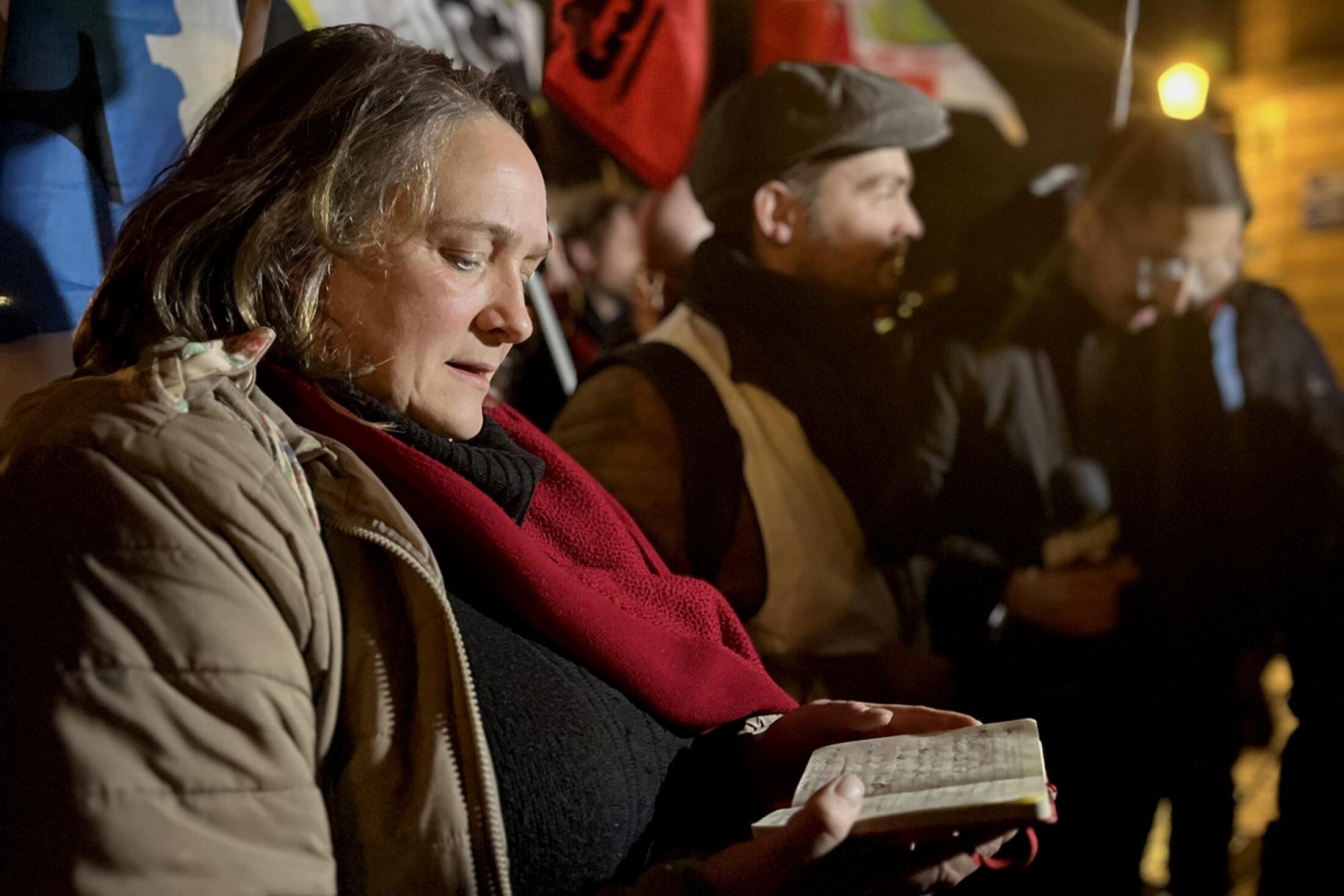The removal of a teenage girl from her school by gendarmes so that she could be deported to Belgium along with her family has caused controversy in France. The story began on January 22nd, when Nado, aged 14, suddenly disappeared from public view after officers came to fetch her from the Paul-Verlaine middle school at Maizières-lès-Metz in north-east France. The young girl, who was on her mid-morning break, was taken to the school office and informed that her mother and younger brother were waiting for her in a gendarme van outside the school.
She emptied her locker, returned her books, and hurriedly said goodbye to two friends she had met at the social housing hostel in the nearby village of Ennery, where she had been living until then. Then she left, destination Belgium. Her family, originally from Burkina Faso, had first applied for asylum there before then coming to France. The French authorities deported her under the Dublin Regulation, the European rule which stipulates in which country a migrant can claim asylum.

Enlargement : Illustration 1

After a week of silence, on January 30th one of Nado’s teachers finally received some news about the teenager. Pupils showed her messages from their former classmate, sent via social media. “She said she was doing well, that she missed us… That’s all,” said the teacher.
Having only arrived at the Paul-Verlaine middle school in December, Nado had already made an impression on the teaching staff through her seriousness and desire to succeed. “A fantastic kid, engaged during class - the model student, really,” said the teacher, still in shock.
'Collective error'
That shock was shared by the fifty or so people who gathered at dusk outside the Moselle prefecture in the nearby city of Metz on January 30th. Teachers from the school and surrounding areas, parents, trade unions, associations and several local political figures - most from the Left - expressed their outrage. Since the case of Léonarda, the schoolgirl arrested and deported to Kosovo during a school trip in 2013, no child from a family facing deportation had been removed from a French school in this way by police or gendarmes.
Later, a small delegation of union and association representatives emerged from the imposing building on the banks of the River Moselle and reported back on their meeting with the sub-prefect, the local state representative. The family - Nado, her mother, and her 10-year-old brother - were indeed being “looked after” on the Belgian side of the border, where they had been placed in a shelter for asylum seekers. But the prefecture admitted to a series of “errors”, at least in how the operation was carried out.
That same morning, the national director of the gendarmerie, General Hubert Bonneau, used the same phrase - “a collective error” - on BFMTV news channel to describe the pupil’s arrest at her school. He reminded officers of the 2013 Valls directive – named after then interior minister Manuel Valls - which strictly prohibits removing a child from a school, even if their family is facing deportation.

Enlargement : Illustration 2

The day before, it was the new education minister herself, Élisabeth Borne, who reiterated this rule to all regional education authorities in France: interventions related to deportation procedures were “strictly forbidden on school premises”.
In Nado's case there had in fact been a series of errors, as the school principal had allowed the pupil to leave, escorted by two gendarmes. According to the Snes-FSU teaching union, the head of the school did try to contact the education authority for guidance before ultimately letting the child go. While some teachers and parents urged against piling “blame” on him, others pointed to what they saw as a form of “somewhat servile obedience”. The principal himself declined to respond to questions from Mediapart.
It was our immediate, united reaction from the very start of this scandalous affair that ensured all this did not happen without a fuss.
“What concerns us is that he isn’t speaking out about this inhumane treatment,” said another teacher who was present on the day Nado was removed. “A colleague emailed everyone the next day asking for an explanation, and he simply replied that it was ‘legal', nothing more.”
Despite the broad consensus condemning the handling of the case, the apologies in recent days have been muted. “The family, who had come in to fulfil their reporting obligation, were informed by the gendarmes of their imminent departure,” explained the prefecture in the neighbouring Bas-Rhin département or county which, along with the Moselle prefecture, was responsible for enforcing the 'obligation de quitter le territoire français' ('order to leave French territory') or OQTF against Nado and her family. “The mother then stated that her daughter was at school. It was with her consent that the gendarmes went to the school, and she was also in the vehicle that took them there. With the agreement of the headteacher, the gendarmes waited until the end of lessons before going to collect the teenager,” it added.
The prefecture nonetheless confirmed that it had since reminded both the gendarmerie and the police of the “terms of the interior minister’s circular from October 19th 2013”.
The mayor of Maizières-lès-Metz, Julien Freyburger, who represents the rightwing Les Républicains, said he had been informed about the incident “only after the story was made public”. He said he “understands and shares the emotion expressed by representatives of the education community,” while also reminding people that law enforcement officers carry out their duties “under difficult circumstances”.
“It was our immediate, united reaction from the very start of this scandalous affair that ensured all this did not happen without a fuss, without protest - we forced everyone to respond,” said Anne Féray, local leader of the anti-racist group Mouvement contre le racisme et pour l’amitié entre les peuples (MRAP) Moselle-Ouest. She spoke of the renewed social bonds that had been forged in the local community, which came together last spring during the snap parliamentary campaign against the far-right.
The mayor and former Communist senator of Talange, a neighbouring town, echoed this sentiment. “When the [trade union] Snes-FSU sent me a message, I thought, this can’t be right - you can’t just take a kid like that,” said Patrick Abate. “I reacted immediately, my Socialist senator colleague did too, and we wrote to the prefect and the education authority straight away. What happened was extraordinary, but it really required unionists, parents, and a handful of us to spring into action! Even those politicians who were hesitant at first have now joined in. Minister Borne is no friend of mine, but at least she’s taking responsibility too…”
A toxic political atmosphere
The current national political mood looms over the entire episode. While Élisabeth Borne reacted strongly, her colleague at the Ministry of the Interior has remained completely silent. For months, interior minister Bruno Retailleau has been stoking public opinion on immigration issues, openly equating those facing a OQTF order with criminals.
On January 23rd, he went so far as to issue an official circular calling for a tougher approach to regularisation requests from undocumented migrants. That same day, prime minister François Bayrou spoke on LCI news channel of a feeling that the country was being “flooded” when it came to immigration, in doing so drawing applause from the far-right.
“What happened at that middle school in Maizières is not a minor incident,” said MP Belkhir Belhaddad from Emmanuel Macron's centrist party Renaissance, who also believes that since the immigration law of 2023, the “balance on immigration issues” within the president's party has been broken. “What happened to that girl could have happened to me,” he added. “I, too, am a child of immigration and of the French republican school system.” Belkhir Belhaddad has called on the Moselle prefect to launch an administrative inquiry.

Enlargement : Illustration 3

“We can't today say that this [episode] is already the direct result of [government] policy,” said Patrick Abate. The Communist mayor knows the gendarmes who came to the Paul-Verlaine middle school and they are “serious guys” he said. “It was a mistake. But how did it happen?” he asked, before answering his own question. “In an increasingly toxic atmosphere, whenever refugees are mentioned. And when we react as republicans to criticise the incident, we know it’s a subject that unsettles parts of our electorate - let’s not fool ourselves…” he said.
Danielle Urschel, president of the Maizières-lès-Metz branch of the FCPE parents’ association, declared: “It’s not easy explaining this to children who don’t understand why a classmate was expelled from France overnight.”
Standing beside her at the the protest gathering in Metz, Karima Bouallag, the mother of a pupil at the school from which Nado was taken, was equally “outraged” by what she called an “inhumane” response. “Equality and fraternity - where have they gone?” she asked.
But not all local parents share this outrage. On social media, some have openly expressed their satisfaction at the expulsion, posting celebratory comments. “This serves as a reminder of the law, and that's something,” said Danielle Urschel. “It won’t bring the family back, but at least it helps people realise that behind the word ‘refugees’ there are real children.”
*
- The original French version of this article can be found here.
English version by Michael Streeter


